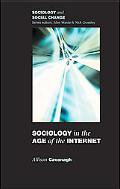

 |

|

The average rating for Sociology in the Age of the Internet based on 2 reviews is 3 stars.
Review # 1 was written on 2017-07-01 00:00:00 John Powers John PowersThe classic ‘compare and contrast’ for first year sociology students is to pit Max Weber against Karl Marx. Weber represents the primacy of ideas in politics and history, particularly religious ones, versus Marx’s materialist conception of history. Or to make it even cruder: Weber is the primacy of politics versus Marx as the primacy of economics. ‘The Agrarian Sociology of Ancient Civilizations’ a very early career study by Weber, undercuts the simplicity of the above. It looks at patterns of economic development in the ancient world, particularly social systems of farming and animal husbandry. Mesopotamia, Egypt, Israel, Greece, and Rome are all examined for their property relations, labor, trade, taxation, and consumption. This is Weber being very materialist, and he is concerned to establish, contra other political economists of his time, that ‘capitalism shaped whole periods of Antiquity’. Thus while he devotes plenty of space to establishing ideal types of ancient civilisations, such as fortress kingdom, aristocratic polis, hoplite polis, bureaucratic city kingdom, he is also trying to demonstrate the ancient influence of free labour, and the presence of property as an object of trade utilised by individuals for profit-making enterprises. This is perhaps an alternative type of materialism to that of Marx, rather than an alternative to materialism. Marx argued that the conversion of products into commodities held a subordinate place in the ancient world (‘Trading nations, properly so called, exist in the ancient world only in its interstices, like the gods of Epicurus in the Intermundia, or like Jews in the pores of Polish society’). Weber is certainly keen to diminish the role of class struggle (‘in Antiquity there are absolutely no social demands from journeymen craftsmen’), but he still comes back to at least materialist-sounding notions (‘nearly all social struggles in Antiquity were essentially for the ownership and use of land’). ‘Agrarian Sociology’ is a book very much aimed at specialists. Weber spends a lot of time debating with obscure scholars, and often throws out very obscure references. E.g. I had to really hunt down a reference to the ‘apotheosis of Arsinoe’ in Ptolemaic Egypt (265 BC) which Weber argues was used by the Hellenistic state to undermine priestly privileges. This is a reference to Queen Arsinoe II,Philadelphos,the wife of Ptolemy II, who was deified after her death and used for a while as an alternative state cult. Weber obviously expected me to know this without Google. One value of this book for a contemporary reader might be the pleasingly short shrift Weber gives to ‘racial theories’ of the decline of ancient civilisations - particularly Rome. Essentially the ‘problem’ (if you were a Roman) was the gradual transfer of authority and military power to the interior of the Empire, away from Rome itself. These were a series of political decisions by various late era Emperors. This part of Weber stood out for me because various far-right groups still argue, over one hundred years after ‘Agrarian Sociology’, that the Roman Empire is the key example of decline due to ‘multiculturalism’ - by which they mean racial intermixing. Weber, who is no-one’s politically correct intellectual, declares that such ideas are ‘unsupported by science, and should be excluded from serious discussion’. No doubt he was hoping, in 1897, that the matter was settled. |
Review # 2 was written on 2016-09-09 00:00:00 Bull Red Bull RedОсновну частину цієї книги становить стаття Макса Вебера, яка і дала назву тому. Також є ґрунтовна передмова Юрія Давидова, а також стаття Ростовцева про колонат. Проте зосереджу увагу на "Аграрній історії древнього світу". На щастя, видання містить третю редакцію цієї статті - 1909 р. Вебер написав три версії - за кількістю видань енциклопедії, куди входила ця стаття. Чому це важливо? Бо цю редакцію вже пише Вебер-автор книги "Протестантська етика та дух капіталізму". А тому він не просто пише про аграрні відносини в Античності, але шукає відповідь на питання: чому капіталізм виник на Заході? Як в "Етиці" найбільш видима відповідь - протестантизм, то тут Вебер шукає вже історичні корені капіталізму. І виявляє іх не в Античності, а в Середньовіччі. А саме - в міській культурі та феодалізмі. Тобто цей текст - це доповнення "Етики". Якщо в ній Вебер натякав і на інші фактори розвитку капіталізму, крім культури (тобто релігії), то в "Аграрній історії" він зосереджується на одному з них - структурних передумовах: міській культурі та політичній організації феодалізму. Вартує уваги, хоча і написано доволі складно: дуже багато уваги Вебер приділяє саме опису античної юридичної та економічної термінології, що просто перевантажує інформацією |
CAN'T FIND WHAT YOU'RE LOOKING FOR? CLICK HERE!!!